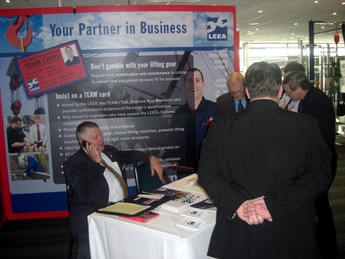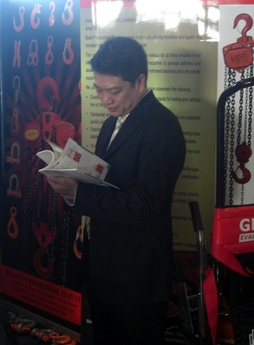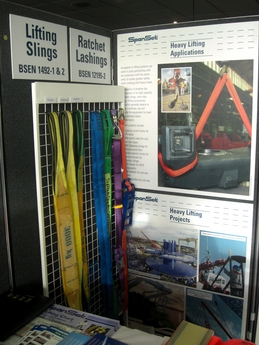LiftEx 2009
16 December 2009The fifth LiftEx show, which took place at the Chester Racecourse, UK, in November, was the biggest and best yet.
LEEA profiled its Test, Examine and Maintain (TEAM) scheme, which ensures only qualified engineers are permitted to carry out work on overhead lifting equipment.

The TEAM scheme includes the issuance of a card to engineers who have passed the association’s diploma examination. Each TEAM card is valid for five years and provides proof of the holder’s qualifications, the equipment they are competent to work on, their identity and their employer. Only full LEEA member companies may issue cards.
LEEA is urging employers to insist that the card is shown by anyone proposing to work on overhead lifting equipment.
Geoff Holden, chief executive of LEEA, said: “Clearly it is vital that overhead lifting equipment remains safe to operate at all times, and this demands a range of specialist skills. Employers must also bear in mind that UK law demands all lifting equipment is subject to periodic thorough examination by a competent person.
"It is therefore vital that they take all the necessary steps to ensure that only properly qualified engineers are allowed to work on their lifting gear.
"The TEAM card is modelled on successful schemes such as the CITB’s Construction Skills Certification programme and the International Powered Access Federation’s PAL card. It is a simple and effective way of helping employers stay on the right side of the law."
This year, Brindley Chains celebrated 25 years since incorporation in 1984 as the sole distributor in the UK for Pewag, the Austrian chainmaker.
Pewag has continued to expand its range of Winner grade 10 chain slings and now offers Grade 12 chains and fittings along with a new range of lifting points and lashing systems.
Pewag Grade 50 stainless steel chains and fittings are in high demand by water companies throughout the UK and Ireland, which Brindley services through a network of distributors.
Brindley Chains has been a LEEA member since 1986.
Carl Stahl Evita profiled its lifting related training, on offer globally and throughout the UK. From wire rope and lifting gear inspection to lifting and slinging, its courses are aimed at companies seeking to train their employees to work competently and safely.
Training manager Geoff Burkill said: “In order to build on our success we have decided to develop our partnership with the Lifting Equipment Engineers Association which, following consultation with the lifting industry, has introduced an accreditation scheme designed to maintain high levels of quality in the field of lifting training.”
Carl Stahl Evita is now offering the following LEEA accredited courses:
- lifting and slinging (practical);
- lifting equipment inspection;
- LOLER and PUWER seminar;
- management of lifting and slinging;
- wire rope inspection;
- wire rope socketing.
Arbil Ltd, a member of the Bills group, manufacturers and distributes lifting, winching and jacking equipment in the UK. It is now a principal supplier to diverse markets such as construction, rail, defence, towing and recovery in addition to many OEMs.
“We are a customer focused company and always strive to deliver the right product, at the right price, at the right time. Our reputation for delivering the highest levels of customer service is supported by nationwide sales, service and hire through our branches in Stourbridge, Coventry and Bristol," it said.
JD Neuhaus showcased its range of lifting equipment.
Vitali International Lifting Equipment Ltd did not exhibit, but director Dennis Wong visited the event from Hong Kong. The company has launched a new version of its K-V Type lever hoist featuring Dacromet coating to key components.
The corrosion resistant metal finishing system protects against salt, humidity, solvents and other corrosive elements.
The K-V Type lever hoist is available in 0.8 to 9t units, with a new 2.5t model. "The unit is lightweight and compact and the patented friction disc design means no brake discs are required," said Wong.
The unit includes a grade 100 galvanized or nickel plated load chain. Each chain block is operationally tested at 1.5 times rated capacity. The unique free wheel design means no preload is required to operate the hoist.
Vitali International also manufacturers a K-II chain block - available from 0.25 to 30t capacity. Both chain block and lever hoist are for the industrial market. The overload protection device is an optional feature.

Vitali International Lifting Equipment Ltd director Dennis Wong stops by the Bash-P International (UK) Ltd stand.
Scotland-based Nautilus Rigging had already announced a distribution agreement in Australia for its new Nautilus Hooks, and said it is in discussion with other potential distributors in the US, China, Norway, Canada, New Zealand and Italy.
Nautilus Rigging has signed an exclusive territorial distribution agreement with Perth’s Unirig Pty Ltd. Unirig has placed an initial order for GBP177,000-worth of Nautilus Hooks, but Nautilus Rigging said the deal could be worth up to £1m over two years.

SpanSet Ltd, part of the SpanSet International Group, provides training courses to support its product range. These courses include:
- safe slinging and lifting appreciation;
- practical slinging beneath the hook;
- rigging and lifting for workers at height;
- lifting equipment - practical inspections and record keeping.
HSE gives remote control presentation
For the first time, LiftEx provided visitors with the opportunity to take in presentations in the neighbouring racecourse grandstand, including Derrick Bailes, technical consultant (formerly chief executive) for LEEA.
A talk was also given by Phil Parry, specialist inspector, Health & Safety Executive (HSE) electrical and control systems group, who explored remote controls. Importantly, he concluded, a CE mark “should not be taken as the be all and end all” when using or buying remote control equipment.
Much of the complication surrounding remote controls derives from the use of emergency stop buttons.
As Derrick Bailes says, with few exceptions, the Machinery Directive requires machines to be equipped with one or more emergency stop devices that enable actual or impending danger to be averted. Relevant harmonised standards for the Machinery Directive, such as the EN 60204 series and EN ISO 13850 (Safety of machinery - Emergency stop - Principles for design) reflect this requirement. Clause 9.2.7.3 of EN 60204-32 requires a separate and clearly identifiable means of initiating an emergency stop function.
Put simply, he says, an emergency stop actuator on a pendant controlled lifting machine is a red button which, when pressed, latches in and de-energises the main contactor that supplies power for all motions of the lifting machine. It must be re-set before the pendant control becomes active again. Although the stop facility on a cable-less control normally works in the same way, EN 60204:32 specifically prohibits this from being labelled or marked as an emergency stop.
There are potentially several situations in which the stop facility would not be considered adequate in an emergency. For example, the control station may not be available to the person who needs to initiate an emergency stop if:
(1) the operator drops it or leaves it unattended;
(2) the person, being someone other than the operator, is unable to locate it.


